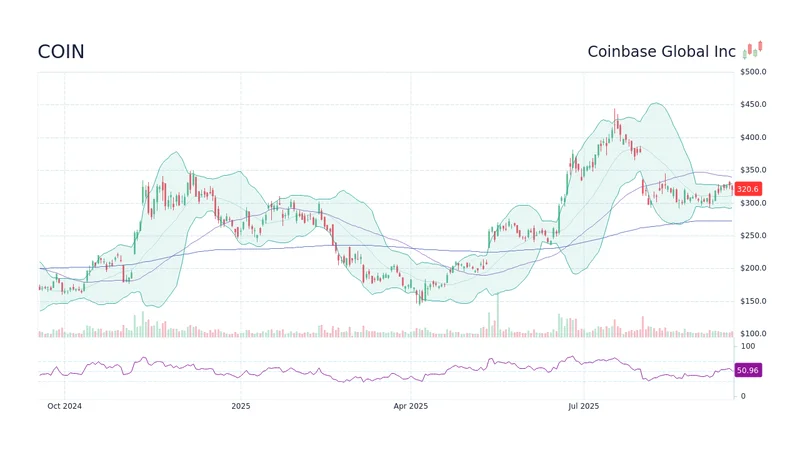Coinbase Stock's Sudden Rally: What's Behind the Jump and Why You Shouldn't Buy the Hype
Let’s get one thing straight. The war is over. Coinbase won.
For years, we watched the SEC, led by its crypto-crusading chairs, try to beat the digital asset industry into submission with nothing but a thick rulebook from the 1930s and a bad attitude. It was "regulation by enforcement," which is just a fancy way of saying they made up the rules as they went along, suing anyone who got too big, too fast. Coinbase was their Moby Dick. The one they had to break to prove a point.
And then, in February 2025, they just… stopped. The SEC dismissed its lawsuit. Poof. Gone.
They trotted out some mealy-mouthed statement about how the dismissal wasn't an "assessment of the merits" but was to allow them to "reform its approach to crypto regulation." Let me translate that for you: "We were about to lose, and a new administration was breathing down our necks, so we’re pretending this was our idea all along." It's the bureaucratic equivalent of a toddler flipping the board game over and declaring they wanted to play something else anyway. It's pathetic.
Did they really think we wouldn't notice? That after years of treating the crypto space like a criminal enterprise, their sudden pivot to a "Crypto Task Force" and calls for a "transparent framework" would be seen as anything other than a full-scale, politically motivated retreat?
The Spoils of War
So what happens when you stare down the federal government and win? You get rich. Obscenely rich.
As of October, Coinbase stock (COIN) is hovering around $363 a share. The company posted a staggering $1.43 billion in net income for a single quarter. That’s not revenue, that’s pure profit. Their market cap is pushing $90 billion. This is the company the SEC tried to kneecap. It’s like watching a guy try to trip a marathon runner at the starting line, only for the runner to get up, win the race, and buy the stadium.

Coinbase isn't some plucky startup anymore. They are the establishment. They’re the custodian for nine of the eleven Bitcoin ETFs and eight of the nine Ethereum ETFs. When Wall Street giants like BlackRock want to play with crypto, they don't call some DAO in a Discord server; they call Coinbase. The company has become the very thing it was supposed to disrupt: a financial titan, a tollbooth operator for the entire institutional crypto market.
This is all great for them, offcourse. But let’s not forget the bodies. While the company is swimming in cash, a New Jersey judge just gave the green light to a shareholder lawsuit from people who bought stock between 2021 and 2023—the very period when the company was allegedly hiding the risks of the SEC crackdown that eventually came. So while the C-suite celebrates their victory, the little guys who got wiped out are still fighting for scraps. And isn't that just the perfect summary of American finance?
The Two Faces of Crypto
It’s almost dizzying to watch the split-screen reality of what Coinbase has become. On one screen, you have CEO Brian Armstrong and other insiders dumping hundreds of thousands of shares, cashing out at the top. You have analysts at Bank of America trimming price targets, whispering that maybe, just maybe, this valuation is a little insane. This is the Wall Street side—the cold, cynical money machine.
Then you look at the other screen. You see Coinbase backing a nonprofit called GiveDirectly, which is dropping $12,000 in USDC stablecoins into the accounts of low-income New Yorkers. A crypto-based Universal Basic Income experiment. They’re trying to see if crypto can be a more efficient way to deliver aid. That ain't a bad idea, I guess. It’s the utopian dream of crypto in action: banking the unbanked, cutting out the middleman, empowering the individual.
So which one is the real Coinbase? The one helping institutions move billions or the one helping a kid in the Bronx buy groceries? The truth is, it’s both. And that’s the problem. The UBI project is a fantastic piece of PR, a heartwarming story to tell while the main business is becoming an indispensable part of the very system crypto was meant to overthrow. It’s a rounding error on their balance sheet, but it buys a hell of a lot of goodwill.
This is the end game. This is what "winning" looks like. You become too big to fail, too integrated to ignore, and too powerful for the regulators to fight. This was never a revolution. It was a hostile takeover. No, that’s not right—it was an audition. An audition to join the club. And Coinbase just passed with flying colors. The question now is, what happens to the soul of an industry when its biggest champion becomes just another bank?
The House Always Wins
Look, let's stop pretending this story has a hero. The SEC isn't some noble protector of the public good; they're political animals who lost a fight. And Coinbase isn't some scrappy band of cypherpunk rebels; they're a publicly-traded corporation that played the game better than anyone else. They fought the beast, and in the process, they became it. They are the new house, and the regulators who once tried to burn it down are now just asking for a seat at the table. Don't ever forget that.
Related Articles
So, You Want to Go to Switzerland: The Real Deal on Flights, Weather, and What to Actually Expect
So let me get this straight. You can quit your cushy $390,000-a-year Google job, cash in your $1.5 m...
Royal Caribbean Norovirus Outbreak: What the CDC Data Reveals and the Numbers Involved
The latest incident report from Royal Caribbean’s Serenade of the Seas presents a tidy, almost clini...
The Truth About Allstate Insurance: Quotes vs. Claims and How They Stack Up to Competitors
So, let me get this straight. Allstate—the company whose entire business model is based on profiting...
TransUnion Data Breach: What Happened and How to Freeze Your Credit
The number, when it finally arrived, was 4.4 million. On August 28, TransUnion, one of the three pil...
The "Aster" Everyone is Suddenly Talking About: A Crypto Breakthrough, Not a Flower
I’ve been watching the digital asset space for a long time, and every so often, you see a moment tha...
EVAA Protocol: A Data-Driven Breakdown of its Core Metrics
The Illusion of Scarcity: Deconstructing the EVAA Protocol Surge The numbers on the screen are, by a...





